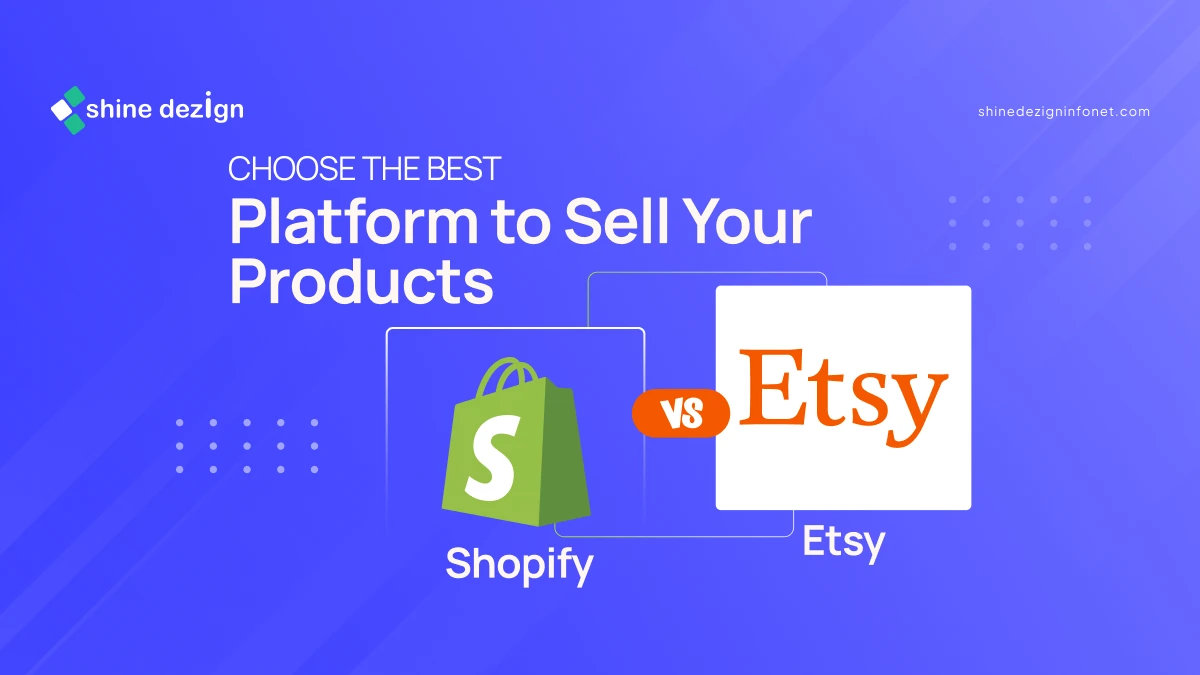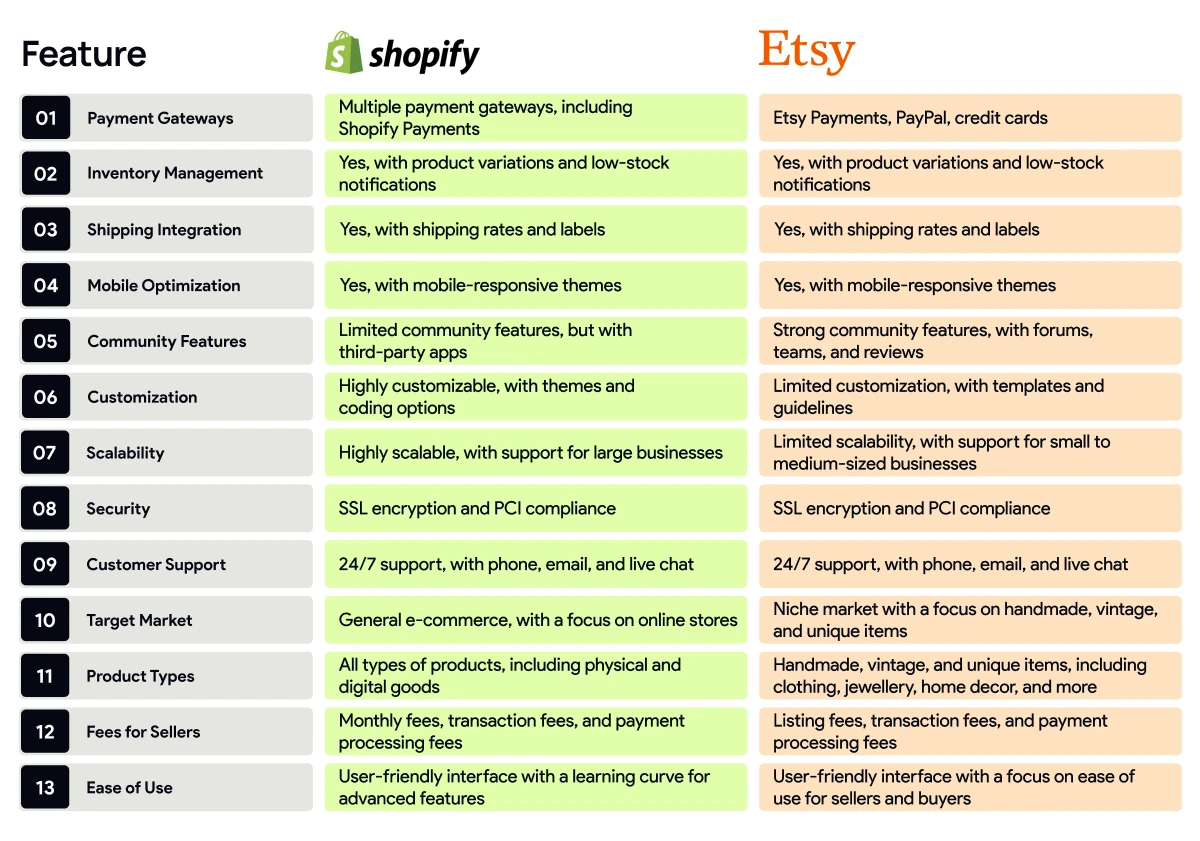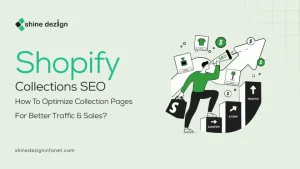Table of Contents
- Introduction
- What is Shopify?
- What are the Advantages of Shopify?
- What are the Disadvantages of Shopify?
- What is Etsy?
- What are the Pros of Etsy?
- What are the Cons of Etsy?
- What is the Difference Between their Charges: Shopify Fees vs Etsy Fees?
- What is the Difference Between Shopify and Etsy?
- What to Choose Between Shopify vs Etsy for Your E-commerce Business?
- Summing Up
Choosing the perfect platform to sell your products can be the key to making or breaking your business. Two of the most prominent platforms for selling online are Shopify and Etsy. Both platforms possess their own features, advantages, and disadvantages, so choosing between Shopify vs Etsy is a critical decision for most businesspeople. In this article, we will explain the specifics of each site and assist you in determining whether Shopify or Etsy is ideal for your business.
What is Shopify?
Shopify is a premium e-commerce solution that helps entrepreneurs & businesses establish, operate, and develop their online stores easily. Shopify was established in 2006 & has grown to become one of the most used solutions for online commerce in an enormous range of industries. The platform offers extensive tools and features that make selling online through a single standalone website, social media, or physical stores easy. Shopify, with its intuitive interface & advanced functionality, enables users to concentrate on developing their business without worrying about the technicalities.
What are the Advantages of Shopify?
Ease of Use:
Shopify is extremely user-friendly, even for those who lack experience with technology. Thanks to the user-friendly interface, which features intuitive and logical navigation and a wizard-based setup that allows users to get going swiftly, the setup and administration of online stores are simplified.
Scalability:
Shopify is designed to grow with your company. The platform accommodates the needs of small businesses and large corporations, so you can expand operations without having to switch platforms.
Security:
Security is Shopify’s top priority, with the provision of SSL certification and PCI compliance for payments. This focus on security instills customer confidence and safeguards sensitive information.
Extensive Support:
Customer support extends to many resources, from tutorials to forums and a full-fledged help desk. The elaborate support mechanism allows customers to troubleshoot issues and learn how to get the most out of the platform’s features.
Custom Domain:
Shopify assists users in associating their own custom domain names, which positively impacts brand reputation and authority. This is a valuable feature for businesses aiming to create a professional web presence.
Regular Updates:
Shopify continuously updates its system with new functionality and improvements, so users are equipped with the latest tools and technologies without needing to maintain updates themselves.
Mobile Optimization:
All Shopify stores are mobile-optimized, providing customers on smartphones and tablets with an uninterrupted shopping experience. This is crucial in the mobile-first age.
Community and Resources:
Shopify has an active user and developer community on a significant scale with plenty of knowledge and resources. Customers can find answers to common questions, share stories, and learn from others in the community.
What are the Disadvantages of Shopify?
Monthly Fees:
While Shopify offers a range of different plans, the monthly subscription fees can add up, especially for small ventures or beginner business owners with tight budgets. Furthermore, costs can increase based on premium themes and apps.
Transaction Fees:
If users don’t utilize Shopify Payments, third-party gateway use can incur extra transaction fees, which may impact the profit margins of high-selling businesses.
Limited Customization:
Shopify has customizable templates, yet some consumers might feel restricted in design options compared to what they can accomplish in self-hosted environments like WordPress through WooCommerce. Extensive customizations might involve coding skills or hiring a developer.
Learning Curve of Advanced Functions:
Although the basic functions are self-explanatory, some advanced functions may have a learning curve. Users may have to invest time learning how to use such functions to the best of their ability.
App Dependency:
Most of Shopify’s advanced features rely on third-party applications, which may lead to increased costs and complexity. Users may have to pay for several subscriptions and integrations to derive the functionality they want.
Content Management Limits:
Shopify is a leading e-commerce platform, and although it has content management, its power as a complete content management system (CMS) cannot match. Businesses with a significant intent to utilize content marketing may find this limiting.
Support Response Time:
Although support operates 24/7, response times are unpredictable, potentially creating delays in solving problems. At peak usage times, some customers will be forced to wait longer for answers.
Data Portability:
Transferring data from Shopify to a different website could be challenging. Users may have difficulties when they download their products’ data, customers’ details, and order history in case they want to switch providers, which inhibits the ease of transferring to a new website.
What is Etsy?
Etsy is an e-commerce website focused on handmade, vintage, and unique items, including clothing, jewellery, home decor, furniture, toys, art, and more. It was founded in 2005 by Chris Schrieffer, Chris Maguire, and Robert Kalin and has since become a popular platform for artists, craftspeople, and small businesses to sell their goods. Etsy’s mission is to “keep human connection at the heart of commerce” by providing a platform for buyers and sellers to connect and exchange unique, handmade, and vintage items.
What are the Pros of Etsy?
Some of the advantages of using Etsy include:
Unique and Handmade Items:
Etsy is a great place to find unique, handmade items. Buyers can find unique gifts, decorations, and accessories that reflect their style.
Supporting Small Businesses:
By shopping on Etsy, buyers directly support small businesses and independent artists, which helps to promote entrepreneurship and creativity.
Community Features:
Etsy’s community features make it easy for buyers and sellers to connect and build relationships. Buyers can ask questions, leave feedback, and connect with sellers on social media.
Easy to Use:
Etsy’s platform is user-friendly and easy to navigate, making it accessible to buyers and sellers of all skill levels. Buyers can easily search for items, read reviews, and complete transactions.
Variety of Items:
Etsy has many items for sale, from clothing and jewelry to home decor and furniture. Buyers can find everything they need in one place.
Competitive Prices:
Many items on Etsy are competitively priced, making it a great place to find deals. Buyers can compare prices, read reviews, and find the best value for their money.
Secure Payment Options:
Etsy’s integrated payment options make it easy and secure for buyers to complete transactions. Buyers can trust that their information is protected and their payments are secure.
Good Customer Service:
Etsy has a reputation for providing good customer service and support. Buyers and sellers can contact Etsy’s customer support team with any issues or questions.
What are the Cons of Etsy?
Some of the disadvantages of using Etsy include:
Fees
Etsy charges sellers a listing, transaction, and payment processing fee, which can eat into profits. Sellers need to factor these fees into their pricing to ensure they are making a profit.
Competition:
With so many sellers on the platform, competition can be fierce, making it difficult for new sellers to stand out. To succeed, sellers need a strong brand, high-quality products, and excellent customer service.
Quality Control:
While Etsy has measures to ensure quality, some buyers may still encounter issues with items not being as described. Buyers need to read reviews, check the seller’s ratings, and ask questions before purchasing.
Shipping Issues:
As with any online marketplace, shipping issues can arise, and buyers may need to wait longer than expected for items to arrive. Sellers need to have a clear shipping policy and communicate with buyers about any delays.
Limited Control:
Sellers have limited control over the design and functionality of their virtual stores. They must work within Etsy’s guidelines and templates to create their stores.
Rules and Regulations:
Etsy has strict rules and regulations that sellers must follow, which can be time-consuming and frustrating. Sellers need to read and understand Etsy’s policies and procedures to avoid any issues.
Technical Issues:
Like any online platform, Etsy can experience technical issues, which can be frustrating for buyers and sellers. Buyers and sellers must be patient and contact Etsy’s customer support team if they encounter any problems.
Return Policy:
Etsy’s return policy can be strict, and buyers may not always be able to return items that don’t fit or meet expectations. Buyers need to read the seller’s return policy and ask questions before purchasing.
What is the Difference Between their Charges: Shopify Fees vs Etsy Fees?
The difference between their charges is:
What is the Difference Between Shopify Vs Etsy?
What to Choose Between Shopify vs Etsy for Your E-commerce Business?
When choosing a platform for your e-commerce business, the first question that arises in your mind is: Is Shopify better than Etsy, and vice versa? Here are the key points to remember while choosing between the two platforms.
Choose Shopify If:
- You have a general e-commerce business.
- You need advanced customization options.
- You want to scale your business.
- You want to sell on multiple channels (online, social media, physical stores).
- You prefer a robust app ecosystem for added functionality.
- You require extensive support and resources.
Choose Etsy If:
- You have a niche business with handmade, vintage, or unique items.
- You want to reach a targeted audience interested in those items.
- You prefer a streamlined and easy-to-use interface.
- You want to take advantage of Etsy’s existing customer base.
- You are looking for lower fees compared to Shopify.
- You value community features and connections with other sellers.
Summing Up
In conclusion, Shopify and Etsy are excellent e-commerce platforms that can help you establish a successful online business. However, they cater to different types of companies and offer distinct features, fees, and target markets.
Shopify is a versatile platform that offers advanced features, scalability, and customization options, making it ideal for general e-commerce businesses. On the other hand, Etsy is a niche platform specializing in handmade, vintage, and unique items, making it perfect for artists, craftspeople, and small businesses.
When choosing between Shopify vs Etsy, consider your business type, scalability needs, customization requirements, and fees. By weighing the pros and cons of each platform, you can make an informed decision that aligns with your business goals.

















